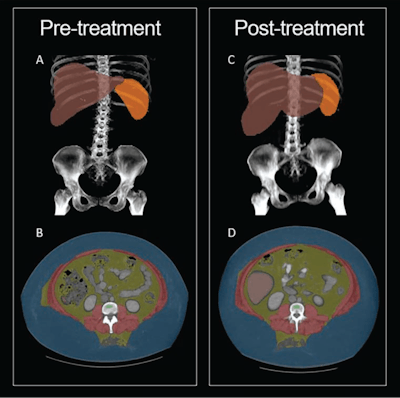While COVID and radiology salaries hit the top of AuntMinnie.com's Top 10 most-read posts in 2023, they rounded out the bottom of this year's list.
Instead, the AuntMinnie community gravitated more toward articles describing how advanced image analysis -- including AI-based assessment of body composition on CT scans -- can track treatment results and predict patient outcomes.
MRI safety also remains a hot-button issue. Among our most popular stories, an incident in North Hollywood, California, demonstrated what can happen when a SWAT team raids an imaging center.
Most-read articles rarely leave out the medicolegal, such as when results of an imaging study are not shared and not addressed, or money matters such as radiology reimbursement.
We make it easy for you to read AuntMinnie's hottest stories of 2024. Read more in the snapshots below.
1. CT shows body composition changes in patients treated with Ozempic

Our most-viewed article focused on using CT-based AI tools to visualize biomarkers of body composition changes in patients using Ozempic (semaglutide) for diabetes type 2 treatment or obesity.
The research suggested favorable shifts in body composition measures related to cardiometabolic risk. On the downside, however, there appeared to be diminished muscle quality, presumably related to accumulation of intramuscular fat.
Researchers from the University of Wisconsin applied a suite of CT-based AI body composition tools to both pre-semaglutide and postsemaglutide scans. The study findings added to current research regarding Ozempic's efficacy, primarily in relation to frailty and mortality risk.
2. MRI shows ties between ovary removal and brain function later in life
A Wake Forest University study showed a concerning trend in women who underwent ovary removal by premenopausal bilateral oophorectomy (PBO) and used conjugated equine estrogens.
Having both ovaries removed before natural menopause can cause sudden endocrine dysfunction, which in turn raises the risk of cognitive impairment and dementia. However, few neuroimaging studies serve to better understand underlying factors, according to the researchers.
Diffusion tensor imaging (DTI) - MRI found that women who underwent PBO before age 40 had significantly lower fractional anisotropy compared with other women in the study. Researchers saw no differences in fractional anisotropy or mean diffusivity white matter integrity for women who had the procedure between the ages of 40 and 44. Women who underwent PBO between the ages of 45 and 49 had lower frontal anisotropy.
There were other findings as well.
3. Overdue baby dies after scan results sent 'to nowhere'
In New Zealand, the results of a scan of an overdue baby with medical concerns were not sent to the mother's midwife. The baby died.
This was a case of the radiology practice miscoding an ultrasound exam conducted on the pregnant patient at 41 weeks that showed low amniotic fluid -- which resulted in the scan being sent "to nowhere," rather than to the mother's midwife.
The New Zealand Herald broke the news, reporting that a complaint was filed with New Zealand's Health and Disciplinary Commission. Pacific Radiology and the midwife were found to have breached the woman's right to care by not sending the scan through and not following up on it.
4. Near-miss MRI incident in California prompts oversight questions
A "freak accident" at a California healthcare facility in April highlighted a lack of standard reporting mechanisms and oversight in MRI safety incidents, this AuntMinnie brief noted.
A trainee reportedly brought a non-MRI-safe wheelchair into a healthcare facility's MRI environment causing a dangerous reaction with the magnets. The wheelchair was sucked across the room, attaching itself sideways to the MRI scanner door, narrowly missing the patient, according to accounts.
Agencies seemed to be playing "pass the buck."
5. Thyroid medication linked to bone loss

In perhaps a surprise development, levothyroxine -- a common medication taken for hypothyroidism -- may be associated over time with bone loss, AuntMinnie.com reported in November. Approximately 23 million Americans take levothyroxine daily.
The study noted that people taking the medication six years or more had greater loss of total body bone mass and bone density compared with nonusers, even in participants whose thyroid-stimulating hormone (TSH) levels were within the normal range.
Co-senior author Jennifer Mammen, MD, PhD, from Johns Hopkins Medicine in Baltimore, MD, recommended a risk-benefit assessment be conducted, weighing the strength of the indications for treatment against the potential adverse effects.
6. Senior radiologist dies in Brazilian plane crash
A radiologist died when his plane destined for São Paulo, Brazil, crashed. Leonel Ferreira, MD, a full member of the Brazilian College of Radiology and Diagnostic Imaging, was one of eight doctors and 62 others who died August 9 in the crash.
Ferreira had reportedly retired three months prior to the trip. He was regarded as a receptive person who helped other doctors in the discussion of cases to reach diagnoses.
News accounts credited Ferreira with opening the Dr. Leonel Ferreira Imaging Center in 1994 in Cascavel, about 930 km (578 miles) west of São Paulo, and installing the region’s first digital x-ray and introducing fully digital radiology reports.
7. SalaryScan: Radiologists and RTs enjoyed higher salaries in 2023
In September, AuntMinnie published results of its annual compensation and benefits SalaryScan survey.
Of radiologists, top billing went to musculoskeletal specialists, who had the highest average base salary of $501,000, while mammography specialists were at the bottom of the list, with an average base salary of $415,000. Radiologists in general reported an average base salary of $473,000 in 2023, up from $439,944 the year before.
Our geographic analysis noted that the West North Central region was the highest paying for radiologists, with an average base salary of $584,000. The South Atlantic region was next, with an average base salary of $507,000. The New England region was the lowest, with an average base salary of $369,000.
We also noted that radiologic technologists (RTs) had an average base salary of $92,000, up from 2022's $85,238. Those who specialized -- particularly in CT, MRI, neuroimaging, and nuclear medicine/PET -- earned more.
8. AuntMinnie 2021: COVID-19 vaccine affects imaging results, researchers warn
Earning a top spot when it was originally published in 2021, this article captured attention once again as part of AuntMinnie's 25-for-25 25th Anniversary activities.
Researchers warned that the COVID-19 vaccine was manifesting on imaging in ways that appeared to be disease. Imaging closely after COVID vaccination showed axillary lymphadenopathy -- examples included a neck mass, swollen axillary lymph nodes on screening breast MRI, clusters of swollen lymph nodes in a patient with a history of liposarcoma, swollen lymph nodes in a patient with a history of triple-negative ductal carcinoma in situ.
Recommendations followed.
9. LAPD officer's gun pulled against an MRI machine during cannabis raid

In an example of MRI risks in the process of law enforcement, a cannabis raid became even more dangerous when a Los Angeles police officer reportedly entered an MRI room with a rifle.
The raid happened in October 2023 at NoHo Diagnostic Center in North Hollywood, but the owner of the outpatient MR imaging center filed a lawsuit in U.S. District Court in September 2024, naming the LAPD, the city of Los Angeles, and individual police officers. Law360.com first reported the case.
Police suspected the outpatient imaging center was a front for an illegal cannabis cultivation facility, according to news reports.
10. Medicare proposed rule again cuts radiology reimbursement in 2025
From bad news of across-the-board radiology reimbursement cuts to good news about Medicare coverage of CT colonography, Sandy Coffta's drilldown of the proposed 2025 Medicare Physician Fee Schedule also highlighted another bit of potentially good news -- that Merit-based Incentive Payment System scoring could have a positive effect on radiology practices in 2025.




















